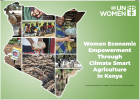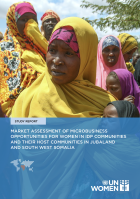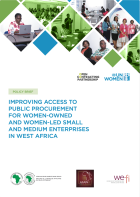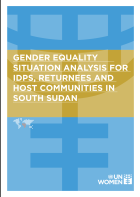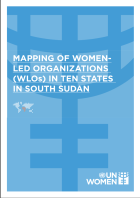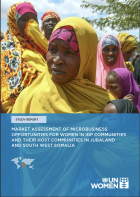1 - 13 of 13 Results
Date:
This strategy is transformational and it aims to seize the momentum
of the Africa Agenda 2063 and the Commonwealth Commitments
on gender equality to place African women’s priorities in the global
development agendas while building on commonalities of the three
regions and mutualizing efforts addressing continental challenges
related to gender equality and women empowerment.
Date:
The WEE-CSA Storybook showcases the success stories of over 2,400 women from Kitui, Laikipia, and West Pokot who have transformed their lives through climate-smart agriculture. Funded by KOICA and implemented by UN Women Kenya, it highlights the project's impact on livelihoods and gender equality while sharing valuable lessons learned. This collection celebrates resilience and aims to inspire further community upliftment for sustainable development in Kenya.
Date:
The publication aims to understand the current landscape of microbusiness in terms of the opportunities, barriers and challenges that women in displacement settings face in accessing economic opportunities in the cities of Kismayo, Dollow and Baidoa
Date:
Women own 30 per cent of the small and medium businesses worldwide, yet women-owned businesses only access 1 per cent of all procurement contracts suggesting systemic gender disparities within procurement systems. This policy brief analyses the extent to and ways in which regional institutions in West Africa could adopt better policies for gender-responsive procurement.
Date:
As gaps remain in efforts to stem the tide of global economic crises, having fiscal policies in place to safeguard spending for women is essential. Gender Responsive Budgeting (GRB) can ensure a gender-equitable allocation of resources and expenditure tracking to promote gender equality. This briefing note provides information on the foundation established to determine entry points for this work, key partnerships, and plans to advance systemic financing for gender equality in the country.
Date:
As gaps remain in efforts to stem the tide of global economic crises, having fiscal policies in place to safeguard spending for women is essential. Gender Responsive Budgeting (GRB) can ensure a gender-equitable allocation of resources and expenditure tracking to promote gender equality. This briefing note provides information on the foundation established to determine entry points for this work, key partnerships, and plans to advance systemic financing for gender equality in the country.
Date:
The policy brief aims to serve as an synthesizes and presents key findings from UN Women-led research; regional online surveys and; advocacy on. making the AfCFTA work for (young) women and (young) women-led businesses, both in the design and implementation of gender-responsive AfCFTA policy reforms and complementary measures, as well as in the soon-to-be negotiated AfCFTA Protocol on Women and Youth in Trade.
Date:
Empowering women in the economy and closing gender gaps in the workspace is key to achieving the 2030 Agenda for Sustainable Development and achieving the Sustainable Development Goals in Somalia. The host community landowners and IDP casual laborers can jointly build their skills in climate-smart agriculture that can benefit the productivity of farms whilst also building the knowledge and skill set of IDPs.
Date:
The African Continental Free Trade Area (AfCFTA) an opportunity for growth and prosperity in Africa. However, because of pre-existing inequalities in African economies, the agreement’s benefits will not be distributed equally along gender lines. As the AfCFTA Secretariat is starting to draft a Women in Trade Protocol, it is important that women across the continent participate actively in the process to voice their views, interests, and needs. This advocacy brief highlights 9 important...
Date:
The rapid assessment publication on Gender and Agricultural Mechanization in Ethiopia provides clear recommendations to inform the agricultural mechanization policy currently under development in the country by adding value to the process through introduction of gender responsiveness approach. The assessment also aims to strengthen enforcement of the existing agricultural mechanization by evaluating current practices in gender and mechanization in the...
Date:
UN Women East and Southern Africa continues to STEP IT UP for gender equality on a daily basis to give voice to women and girls who are still challenged with the violence, injustice, unequal opportunities and prejudices because of their gender.
Date:
This is a convening report for the Regional Sharefair on Gender and Resilience in Africa held by UN Women in collaboration with key partners in November 9th –10th 2016 at Safari Park Hotel, Nairobi, Kenya. Focusing on the main theme of “Strengthening Resilience by Empowering Women”, the Sharefair provided a platform for sharing and learning, availed an opportunity to further explore the role of women in building and strengthening resilience and promoted dialogue and sharing of experiences on gender responsive resilience related programmes and policies in Africa. This is expected to accelerate development and humanitarian response and the overall achievement of the Sustainable Development Goals (SDGs). The Sharefair also endeavor to facilitate long term collaboration amongst regional stakeholders with the aim of identifying problems, using data and predictive methods and mobilizing support and resources to incubate, accelerate and scale effective solutions. The outcome of the two-day event was the creation of a strong regional network to amplify resilience solutions, sustaining change in policy and practice within relevant macroeconomic frameworks. Hundreds of participants gathered at the Sharefair to discuss interventions, innovations, good practices, evidence from research and documented data, legal frameworks and policies.
Date:
In this issue : -Introduction: the gender gap in agricultural productivity -Three takeaways on the gender gap in agricultural productivity -Measuring the cost of the gender gap in agricultural productivity -Costing the factors that contribute to the gender gap in agricultural productivity -Finding the biggest bang for the buck: cost-effective policy interventions -Moving from recommendations to implementation -Appendix A: Methodology for quantifying the cost of the gender gap in...


